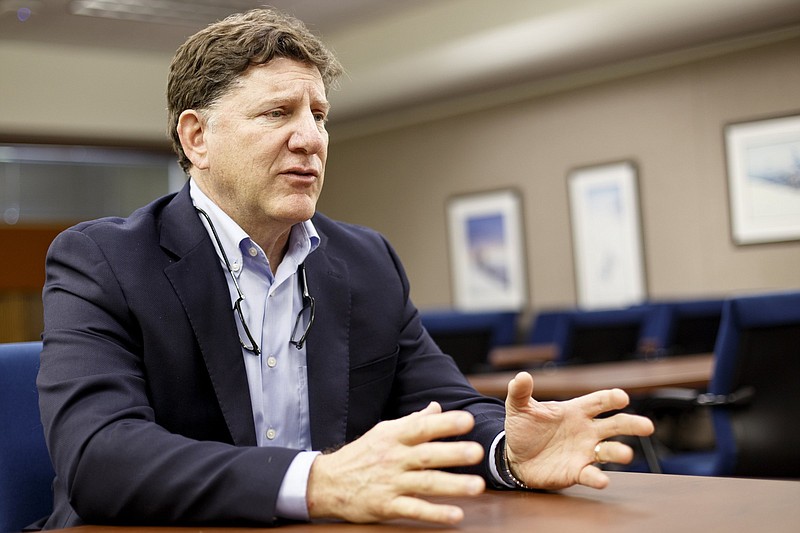In the high-stakes power battle to keep its biggest customer, the Tennessee Valley Authority is sweetening its offerings to Memphis with promises to help build a major inland port on the Mississippi River to create more jobs and a new energy savings initiative to help lower the energy burden faced by many low-income Memphians.
At the same time, TVA is also providing a potential way for customers of Memphis Light Gas & Water to avoid some of the rate increases they thought were ahead.
TVA President Jeff Lyash said Tuesday he has spent much of his first year in office trying to listen to concerns voiced by those in Memphis, which is considering leaving TVA after 91 years and getting its power elsewhere.
"TVA has not always delivered the value to Memphis that it should have, which is our job as a pubic power partner," Lyash said Tuesday after meeting with the Memphis City Council.
Lyash's words echoed what Memphis leaders have been complaining to TVA about for years since MLGW began studying whether to leave the TVA fold nearly two decades ago.
"Memphis has not been treated like it's their best customer," Memphis City Councilman Martavius told WATN-TV in Memphis.
Lyash outlined steps Tuesday he claims could provide up to $535 million of extra value for Memphis over the next 20 years, which he hopes will convince the City Council and MLGW directors to stick with TVA.
Lyash insists that the federal utility isn't giving any special deals to Memphis it doesn't try to offer across its entire 7-state service territory.
The Memphis utility, which pays TVA about $1 billion a year and accounts for 9% of all TVA electricity sales, currently has relatively few TVA employees compared with cities like Knoxville where its corporate headquarters is located or Chattanooga where TVA's power headquarters and nuclear division is based. To help boost TVA staffing in downtown Memphis and address the relatively high share of income Memphis residents pay for electricity, TVA is proposing to create Core Community Revitalization program targeted at helping to reduce the energy burden for low-income home owners and renters in Memphis.
TVA will contribute up to $10 million a year for the next decade to assist community revitalization programs in Memphis and TVA will double its support for the Home Energy Uplift program that helps improve the energy efficiency of home and apartments to help lower monthly electric bills.
"TVA will sponsor a forum to identify challenges and opportunities related to energy burden reduction and will provide $3 million in matching funds toward identified actions," Lyash said in a letter to MLGW President J.T. Young.
The new initiatives would bring about 100 TVA jobs to downtown Memphis, which Lyash said would serve as a model and a corporate headquarters for such programs for TVA to spread across the Tennessee Valley.
Lyash also said TVA will provide a prime 500-acre site being cleaned up and restored at TVA's former Allen coal plant in Memphis to help develop a major inland port in a slough off of the Mississippi River. For over two years, the Economic Development Growth Engine (EDGE) in Memphis has worked with American Patriot Holdings in Miami to develop the Mississippi River as a port for shipping containers to be unloaded to serve industries in the Midsouth.
The port is proposed to be built on the site of the former Allen coal plant, which TVA closed in 2018, and potentially such a project could spur billions of dollars of trade and development in and around Shelby County, Lyash said.
To help MLGW ease its current need to raise rates for power infrastructure upgrades, Lyash also proposed Tuesday to buy from MLGW its high voltage transmission lines that TVA now leases from the Memphis utility. Depending upon the final value assessment, TVA could pay MLGW about $400 million, which could help Memphis to pay for upgrades in its distribution network which led the utility to raise rates by 3% this year.
Lyash said the extra benefits TVA has outlined, in addition to the advantages of a more reliable and stable power network, should end up proving to be less costly for Memphis than having the city-owned utility build its own generation or turn to the Midcontinent Independent System Operator (MISO) for future power.
MLGW must give TVA a 5-year notice before it could leave TVA, but a study earlier this year by the energy consulting firm Siemens calculated that Memphis could still save an estimated $120 million a year in present-day value if it replaced TVA with its own generation and with wholesale power purchases from MISO.
But TVA claims Memphis power rates would still be cheaper if the utility stays with TVA, citing $221 million of extra expenses for building generation and distribution not adequately estimated in the Siemens report.
Among the 154 distributors of TVA power, MLGW is among only a dozen that have not signed new long-term power agreements to buy most of their wholesale power from TVA for at least the next 20 years. Middle Tennessee Electric Membership Coop, which recently merged with the Murfreesboro Electric Department and is now TVA;s third biggest distributor, signed a long-term purchase agreement with TVA last week.
Contact Dave Flessner at dflessner@timesfreepress.com or at 757-6340
